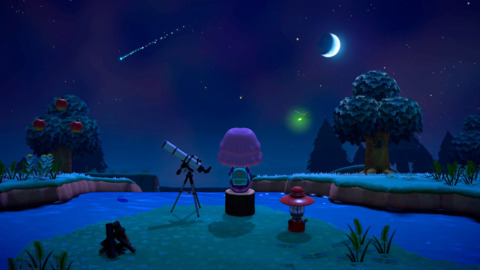The Strange Dichotomy of Animal Crossing
By ItsMagicNeal 0 Comments
I let out a groan, watching as a precious tarantula skitters off the edge of a pond and topples down into the water with a splash, never to be seen again. Begrudgingly, I resign myself to claiming the nearby giant water bug, haphazardly tossing my net into the water and fishing it out. I now know I’ve effectively lost 6,000 bells because of the difference in selling price for these bugs to Timmy and Tommy; if Flick has arbitrarily decided to grace my island with his presence that increases my loss to 9,000 bells as he buys everything for x1.5 its value. This is my third trip to a Nook Island today, with each visit costing me two thousand Nook Miles and requiring me to craft a new set of tools each time, as I leave them behind so I can carry more precious bugs back home with me. Given the decrease in payout, I now grapple with the simple question of ‘Am I earning enough bells for this to be worth my time?’

Despite its adorable, toy-esque appearance, Animal Crossing New Horizons is a game that is teeming with economic decision-making and, somewhere deeper than that, systems that will generate a greater resentment for capitalism as a driving force within society. Of course, Animal Crossing’s capitalism is not our capitalism because, hypothetically speaking, Animal Crossing is never stricken with plagues that prevent people around the globe from going to work and more brazenly than that the value of the Bell neither increases nor decreases. However that does not prevent itself from presenting players with copious monetary expenses for access to in-game items and accommodations, all of which are paid through a simple loop of gather resources then sell items then spend money. Ignoring the potentially problematic narrative of draining natural resources for profit, this gameplay cycle feels like it is designed to resemble a cathartic, ritualistic practice akin to tending to a garden: It requires effort, but is supposed to reward through self-satisfaction. Still, as prices for items and home upgrades increase the means for acquiring wealth remain the same, and a drastically higher time-investment will be required for a player to complete their fourth home upgrade as opposed to their first, and they will watch their returns dwindle before their eyes.
Back on my island I deposit the collected insects in my home as I must wait for 8 AM in real-world time for the shop to open where I may sell them; until then they will act as a burden in my inventory, with each one taking up an individual space in my storage capacity. I venture back outside, passing the museum filled with bugs, fossils, and fish I have collected and surrounded by flowers I grew over the course of several real-life days. Along the way I encounter one of my villagers, Lyman the lime-colored koala, who once again tells me something about his workout regimen, as his identity seems to revolve solely around his time in the gym. Every time I speak to him, or any of the other animal denizens of my town, it feels as if I am pulling the string on the back of a doll to hear it recite one of its voice lines. These conversations hardly convey depth within their personalities and rarely offer any form of back-and-forth dialogue that has been prevalent in role-playing games for decades. Instead they are simply cute, Lyman is enjoying himself and has flowers rotating around his head while he emotes, the simplistic model offering a broad smile across its softly-textured face. Regardless, I step into the tent I assembled to allow me to recruit new citizens to move onto my island, and am greeted to a blue and yellow color-eagle. He is a prick, but as I’d like to improve my island and this is sometimes gated behind the number of villages who live there, I recruit him anyways.

To further this analogy that the villagers of Animal Crossing are toys, the system for collecting them is a simple capsule machine; insert your quarter and hope you receive the one you want. Remember those? Despite them not being as prevalent as they once were, they are plentiful in digital landscapes, from gacha games to loot boxes, all offering the thrilling adventure of popping something open and praying that it will contain the missing member within your collection. Those systems were designed with the simple prospect of generating money, and as Animal Crossing players can recruit a specific villager to move in by acquiring an Amiibo card for that character which are purchased, get this, in card packs, this feels much the same. It acts as an arbitrary, and brazenly foul, exploitation to prevent players from easily accessing cosmetic content within a game that they have spent money, not bells, on.
Our strange dichotomy lies here, in the fact that purchasing this toy set does not simply allow you to play with the toys, and instead requires an immense amount of inane assembly in order to acquire specifically what you’d like. But this is a digital play set, and the reason that I must spend my evenings hunting tarantulas for eight thousand bells a piece are arbitrary; the toys could have come assembled, but I am meant to enjoy assembling them. I, however, do not, particularly when it sometimes gives the impression that the assembly process is extended like something from a game that is hoping you will continue to pay its subscription; Animal Crossing costs a one-time fee of sixty dollars. Perhaps I’m likening Animal Crossing to Minecraft’s Adventure mode, and wishing it would include a Creative variant where I am unrestricted by resource and am allowed to select the villagers I desire in a town of my constructing. Or perhaps I’m frustrated that this video game decides to resemble real-world quandaries of repetitive labor in the name of affording goods I desire and doesn’t instead provide me an outlet to expel that frustration (I would love to shit talk Nook with my other villagers). Either way, I can’t shake this feeling that Animal Crossing is a game that could perhaps be enjoyed even without traditional game concepts such as progression or an economy, and instead lean on the charm and character that is wholly unique to it.
